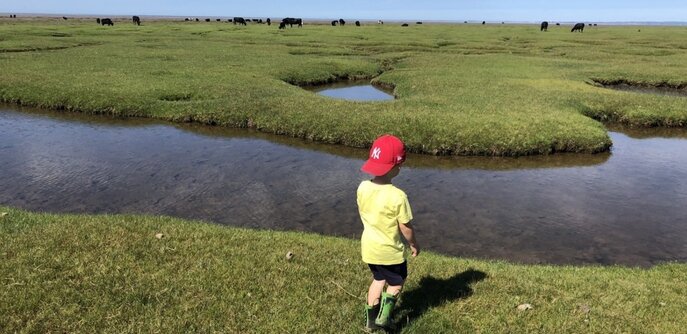Behind the red tractor: Who are our farming families?

In this blog, Dr Claire Hargreaves, an ADR UK Research Fellow based at Lancaster University, explains why understanding the farming household is so essential to creating good agricultural policy.
My background is in applied statistics and data science, and throughout my career, I’ve worked with a wide range of datasets, from small surveys to large-scale population data. But beyond my academic work, I’m also a farmer. For over a decade, I’ve been part of our family farm in the North West of England, working alongside my husband and in-laws.
Attending ADR UK’s 2023 conference, I was initially focused on learning more about data linkage methods and family court data. However, a presentation by Dr Paul Caskie and Sian Morrison-Rees on the new agricultural dataset AD|ARC (Administrative Data | Agricultural Research Collection) caught my attention. The idea of combining my love for farming with my expertise in data was too exciting to ignore.
The human side of farming
Farming is crucial to the UK’s economy and environment, providing food security and shaping landscapes. But farms are more than businesses; they are homes. The farm household plays a significant role in its success, with family members often contributing unpaid work while living and working in the same space.
However, farming households face mounting challenges:
- Climate change is resulting in unpredictable weather patterns making farm practices more challenging
- Policy changes post-Brexit are creating significant economic uncertainties
- Rising costs are resulting in tighter profit margins
Current policies focus on farm productivity and environmental impact but often overlook the people behind the business. Understanding the complex relationship between farm businesses and farm households is essential for designing effective support schemes.
Filling the knowledge gap with data
Policy discussions often rely on farm business data, ignoring the human dimension of farming. We need to understand the farmers themselves—their families, working conditions, and health - to create policies that provide comprehensive support, ensuring the resilience and sustainability of farming families. This is where administrative data, like AD|ARC, can help.
I'm researching farming households in England and Wales using AD|ARC data to get a better understanding of who they are and how they operate. I’m looking at things like family structure, income, farm size, and subsidies, while also identifying different types of farm households. In Wales, I’m diving deeper into health records to see how farmers access healthcare and what trends exist in their mental and physical well-being. Ultimately, it’s all about finding ways to support our farming community better.
Throughout this research, I’ll be supported by a steering group that includes members of national farming organisations (NFU, NFU Cymru, RABI, FCN), the Department for the Environment, Food and Rural Affairs, the Welsh Government and independent academic experts.
Understanding the people who work and live on the farm is key to building a sustainable future
This research will give policymakers and farming stakeholders a more complete picture of UK farming households. By recognising the diversity within farming communities, policies can be more tailored and equitable, ensuring that support reaches the full breadth of the community.
Understanding the people behind the farms is key to building a sustainable future—not just for agriculture and the environment, but for the families like mine whose lives revolve around it.

